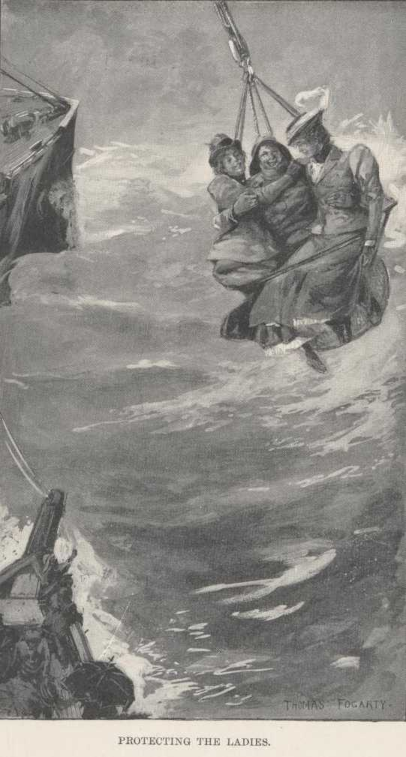November 27, 1895
The family celebrated Livy’s birthday aboard the Rotomahana, which arrived in Hawke’s Bay a mile from Gisborne, and, some 20 hours from Auckland, three hours ahead of schedule. Sam described the ship as “roomy, comfortable, well-ordered, and satisfactory” [FE ch XXXIV 315]. Due to high seas the ship could not dock. Sam watched as the Greenwood Theatrical Co. and four prisoners, disembarked in a basket over the rough seas into the small steam launch Snark for transport to shore. As a result of the
rough seas and the harrowing nature of deboarding, the lecture in Gisborne was cancelled.
Sam gave an interview aboard the ship with W. Good of the Poverty Bay Herald saying that the ship could not dock and he did not “fancy coming ashore in the Snark.” The interview, with almost no quotations, ran on Nov. 28 [Shillingsburg, At Home 162; “Down Under” 27].
Chapter 34, Following the Equator

We were a mile from shore; a little steam-tug put out from the land; she was an object of thrilling interest; she would climb to the summit of a billow, reel drunkenly there a moment, dim and gray in the driving storm of spindrift, then make a plunge like a diver and remain out of sight until one had given her up, then up she would dart again, on a steep slant toward the sky, shedding Niagaras of water from her forecastle—and this she kept up, all the way out to us. She brought twenty-five passengers in her stomach—men and women—mainly a traveling dramatic company. In sight on deck were the crew, in sou'westers, yellow waterproof canvas suits, and boots to the thigh. The deck was never quiet for a moment, and seldom nearer level than a ladder, and noble were the seas which leapt aboard and went flooding aft. We rove a long line to the yard-arm, hung a most primitive basketchair to it and swung it out into the spacious air of heaven, and there it swayed, pendulum-fashion, waiting for its chance—then down it shot, skillfully aimed, and was grabbed by the two men on the forecastle.
A young fellow belonging to our crew was in the chair, to be a protection to the lady-comers. At once a couple of ladies appeared from below, took seats in his lap, we hoisted them into the sky, waited a moment till the roll of the ship brought them in overhead, then we lowered suddenly away, and seized the chair as it struck the deck. We took the twenty-five aboard, and delivered twenty-five into the tug—among them several aged ladies, and one blind one—and all without accident. It was a fine piece of work.
Gisborne
scott
30 November 2021